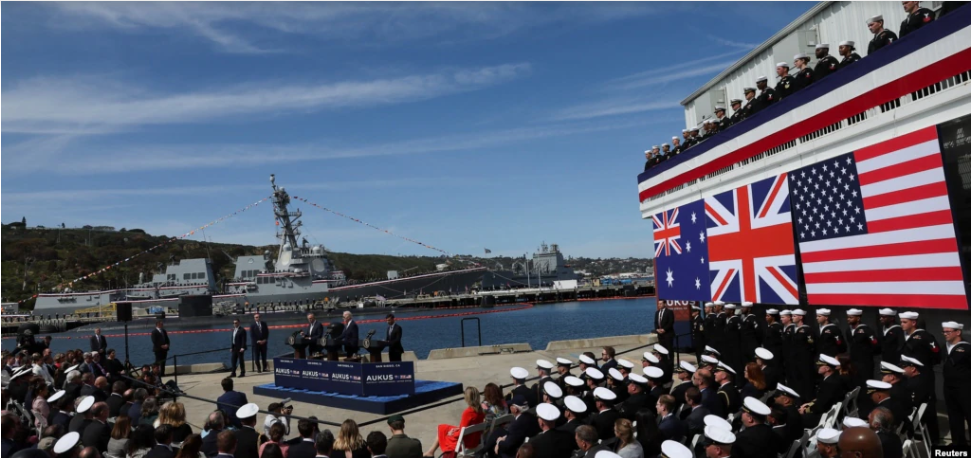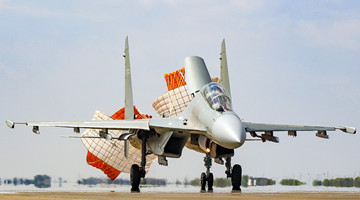By Nie Shuyi

The US, the UK and Australia announce their cooperation on nuclear-powered submarines at a ceremony held at Naval Base San Diego in California. (Photo from Reuters)
On March 15, Chinese Foreign Ministry spokesperson Wang Wenbin stated that China is gravely concerned about the IAEA Director General's latest statement in relation to the AUKUS nuclear submarine cooperation and firmly opposed to the US, the UK and Australia's coercing the IAEA Secretariat into endorsement on the safeguards issues. The three countries asserted they will fulfill nuclear non-proliferation commitments, yet this is nothing but high-sounding rhetoric to deceive the world. Therefore, their cooperation poses serious nuclear proliferation risks, is in contravention of the object and purpose of the Treaty on the Non-Proliferation of Nuclear Weapons (NPT), and deals a blow to the international non-proliferation system.
It is reported that the UK and the US have set their sights on establishing a rotational presence of one UK Astute-class submarine and up to four US Virginia-class submarines at HMAS Stirling, located near Perth in Western Australia, as early as 2027, and a new submarine base will be built on the east coast of Australia to support the nation's new nuclear-powered submarines. After 2030, the US will first sell three second-hand Virginia class submarines to Australia, and gradually deliver new nuclear submarines over the next 20 years or so. By 2058, Australia will have had a new fleet of eight nuclear-powered submarines.
This move by the three countries could bring great instability to regional security. As early as September 15, 2021, they announced the establishment of the so-called AUKUS trilateral security partnership and expressed their support for Australia's building of a nuclear submarine force. Concerns about the serious security crisis that this move would cause in the Asia Pacific region have come forward ever since.
On February 7, 2023, US Admiral Harry Harris Jr. testified at a congressional hearing that delivering nuclear submarines to Australia "will change the balance of power in the region". Allan Behm, director of the International & Security Affairs Program at the Australian independent think tank Australian Institute, pointed out that Australia's construction of nuclear submarines may prompt other allies of the US to make similar requests, thereby posing a risk of an arms race.
At the same time, Australia itself may also become an important risk factor in regional instability. Valery Kistanov, director of the Center for Japanese Studies at the Institute of Far Eastern Studies under the Russian Academy of Sciences, said in an interview with Sputnik, "The AUKUS movement may result in regional instability." Paul Keating, former Prime Minister of Australia and former leader of the Australian Labor Party, issued a statement on March 15, reading that the AUKUS nuclear submarine deal is the worst decision made by the Australian Labor Party over the past century or so, and blamed Australia for uncritically catering to the strategic will of the US.
The deal could also invalidate these efforts made to build a denuclearized region in the South Pacific Area. As early as September 15, 2021, New Zealand announced that it would adhere to its "nuclear-free policy" and prohibit Australian nuclear submarines from entering New Zealand following the release of the AUKUS nuclear submarine deal. On March 14, the Ministry of Foreign Affairs of the Republic of Indonesia issued a statement stating that "it is hoped that Australia will continue to comply with its obligations as guaranteed by the NPT and IAEA."
It is extremely sarcastic that over the past few years, the US has continuously intervened in the plans of some small countries in the peaceful use of nuclear energy on the grounds of "preventing nuclear proliferation" while taking its own geopolitical interests into account. Now, the US, also for its own geopolitical interests, is willing to transact its highly sensitive nuclear technologies and disrupt the order of regional cooperation. The US' naked double standard act has exposed its true face of seeking selfish gains under the pretext of upholding international law.
The Asia Pacific region has developed into the most dynamic and fastest-growing region in the world, which is closely related to the peace and stability created by the concerted efforts of regional countries over the past 40 years. If the US, the UK and Australia really want to make efforts to seek regional prosperity and development, as well as global peace and stability, they should carefully listen to the voices of the international community and regional countries, discard the outdated Cold War zero-sum mentality and narrow geopolitical mindset, earnestly fulfill its international obligations, and refrain from doing anything that undermines regional and world peace and stability.
Editor's note: Originally published on haiwainet.cn, this article is translated from Chinese into English and edited by the China Military Online. The information and opinions in this article do not necessarily reflect the views of eng.chinamil.com.cn.









